- Home
- Franz Kafka
The Trial: A New Translation Based on the Restored Text Page 13
The Trial: A New Translation Based on the Restored Text Read online
Page 13
In such and similar speeches the lawyer was inexhaustible. They were repeated at every visit. Progress had always been made, but the nature of this progress could never be specified. He was always at work on the first petition, but it was never finished, which generally proved at the next visit to have been a major advantage, since the last time, and there had been no way of foreseeing this, the circumstances had been quite unfavorable for its submission. If, on occasion, exhausted by these speeches, K. remarked that even considering all the difficulties, things seemed to be progressing quite slowly, he received the rejoinder that the progress was not at all slow but that things would doubtless be much further along had K. contacted the lawyer in a timely manner. Unfortunately he had neglected to do so, and this failure would result in further disadvantages, and not merely temporal ones.
The only welcome interruption during these visits was Leni, who always knew how to arrange things so that she served the lawyer’s tea in K.’s presence. Then she would stand behind K., apparently watching the lawyer as he bowed deeply over his cup, almost greedily, to pour his tea and drink it, while she secretly allowed K. to grasp her hand. Total silence reigned. The lawyer drank, K. squeezed Leni’s hand, and Leni sometimes dared to stroke K.’s hair softly. “You’re still here?” asked the lawyer, when he had finished. “I wanted to clear away the dishes,” said Leni, there was a last squeeze of the hand, the lawyer wiped his mouth and started speaking to K. again with renewed vigor.
Was it consolation or despair the lawyer sought to produce? K. didn’t know, but he soon held it for an established fact that his defense was not in good hands. Everything the lawyer said might be true, although it was transparently clear he was primarily interested in emphasizing his own role and had probably never had a trial as important as he considered K.’s to be. But the constant emphasis on his personal contacts with officials remained suspicious. Were they being exploited solely to K.’s advantage? The lawyer never failed to remark that these were only lower-level officials, officials who were thus themselves in a position of dependence, and for whose advancement certain developments in the trials might presumably be of importance. Were they perhaps using the lawyer to effect such developments, which would of course be to the defendant’s disadvantage? Perhaps they didn’t do so in every trial, that would be unlikely; there were probably other trials in the course of which they allowed the lawyer certain advantages in exchange for his services, since they surely wished to maintain his good reputation undamaged. If that’s how things really stood, however, what tack would they take in K.’s trial, which, as the lawyer explained, was a very difficult and important one that had excited a great deal of attention at court from the very start? There couldn’t be much doubt about what they would do. Signs of it could already be seen in the fact that the first petition had still not been submitted, although the trial had already lasted for months, and that according to the lawyer everything was still in the beginning stages, which was of course admirably suited to lull the defendant to sleep and keep him in a state of helplessness, so that they could assault him suddenly with the verdict, or at least announce that the inquiry had concluded unfavorably for him and was being passed on to higher administrative authorities.
It was absolutely necessary for K. to intervene personally. It was precisely in states of extreme fatigue, as on this winter morning, when his thoughts were drifting aimlessly, that this conclusion seemed most inescapable. The contempt he had previously borne for the trial no longer applied. If he had been alone in the world he could have easily disregarded the trial, although then the trial would surely never have occurred at all. But now his uncle had already taken him to the lawyer, and family considerations were involved; his job was no longer totally independent of the course of the trial, he himself had been incautious enough to mention the trial to a few acquaintances with a certain inexplicable feeling of self-satisfaction, others had heard about it in unknown ways, his relationship to Fräulein Bürstner seemed to fluctuate with the trial itself—in short, it was no longer a matter of accepting or rejecting the trial, he was in the midst of it and had to defend himself. If he was tired, he was in trouble.
There was of course no reason to be overly concerned for the time being. He had managed to work his way up to a high position in the bank in a relatively short period of time, and, respected by all, maintain that position; all he had to do now was turn the abilities that had made that possible partially toward his trial and there was no doubt everything would turn out well. Above all, if he wanted to get anywhere, he had to reject the notion of any possible guilt right from the start. There was no guilt. The trial was no different than a major business deal of the sort he had often concluded advantageously for the bank, a deal in which, as was customary, various dangers lurked that must be avoided. To accomplish this, no notion of any sort of guilt dared be entertained of course, all thought must be focused as clearly as possible on one’s own advantage. From this point of view it was also unavoidable that the lawyer be dismissed as soon as possible, preferably that very evening. It’s true that was unheard of according to his stories, and no doubt quite insulting, but K. couldn’t allow his own efforts in the case to run into hindrances that were perhaps occasioned by his own lawyer. Once he had shaken off his lawyer, however, he would need to submit the petition immediately, and to keep pressuring them, daily if possible, to consider it. To accomplish this K. would obviously have to do more than simply sit in the hall with the others and place his hat beneath the bench. He, or the women, or some other messengers, would have to besiege the officials day after day and force them to sit down at their desks and study K.’s petition, instead of staring through the grille into the hall. These efforts must be continuous, with everything organized and supervised; for once the court was going to run into a defendant who knew how to stand up for his rights.
But even though K. felt he could handle all this, the difficulty of composing the petition was overwhelming. At one point, about a week ago, it was only with a sense of shame that he could even contemplate having to prepare such a petition some day; that it might be difficult had not even occurred to him. He recalled how one morning, when he was inundated with work, he had suddenly shoved everything aside and taken out his notepad to have a try at drafting the general outlines of such a petition and perhaps making it available to his slow-witted lawyer, and how at that very moment the door of the head office had opened and the vice president had entered laughing heartily. That had been very embarrassing for K., even though the vice president was not, of course, laughing at the petition, of which he knew nothing, but at a stock market joke he’d just heard, a joke that could only be fully appreciated by means of a drawing, which, bending over K.’s desk and taking K.’s pencil from his hand, he sketched upon the notepad intended for the petition.

 Diaries of Franz Kafka
Diaries of Franz Kafka Metamorphosis and Other Stories
Metamorphosis and Other Stories The Castle: A New Translation Based on the Restored Text
The Castle: A New Translation Based on the Restored Text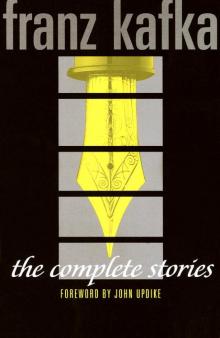 The Complete Stories
The Complete Stories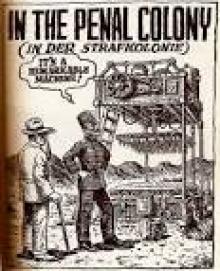 In the Penal Colony
In the Penal Colony The Trial
The Trial Amerika
Amerika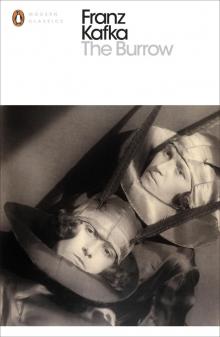 The Burrow: Posthumously Published Short Fiction
The Burrow: Posthumously Published Short Fiction Sons
Sons Letters to Milena
Letters to Milena Investigations of a Dog: And Other Creatures
Investigations of a Dog: And Other Creatures Collected Stories
Collected Stories The Great Wall of China
The Great Wall of China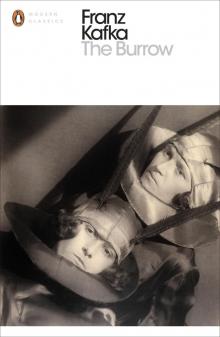 The Burrow
The Burrow The Castle
The Castle The Meowmorphosis
The Meowmorphosis The Sons
The Sons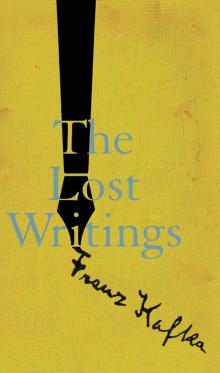 The Lost Writings
The Lost Writings The Unhappiness of Being a Single Man
The Unhappiness of Being a Single Man Amerika: The Missing Person: A New Translation, Based on the Restored Text
Amerika: The Missing Person: A New Translation, Based on the Restored Text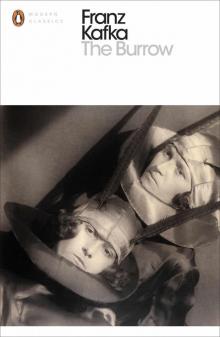 The Burrow: Posthumously Published Short Fiction (Penguin Modern Classics)
The Burrow: Posthumously Published Short Fiction (Penguin Modern Classics) The Diaries of Franz Kafka
The Diaries of Franz Kafka Investigations of a Dog
Investigations of a Dog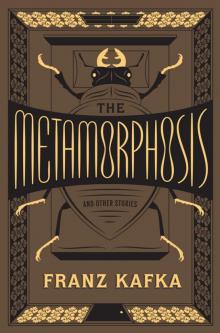 The Metamorphosis and Other Stories
The Metamorphosis and Other Stories The Trial: A New Translation Based on the Restored Text
The Trial: A New Translation Based on the Restored Text